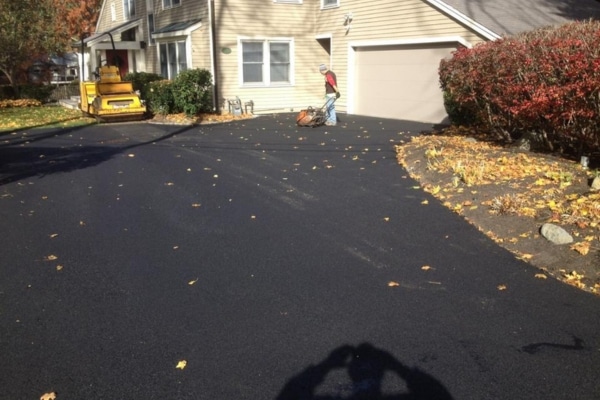Driveway paving is a significant investment that can enhance the beauty and functionality of your property. However, the success and longevity of your newly paved driveway greatly depend on the weather conditions during and after the paving process. Understanding how weather impacts driveway paving is crucial for making informed decisions and ensuring a durable, high-quality result. In this blog post, we’ll explore the key aspects of how weather conditions affect driveway paving.
Temperature
Temperature plays a critical role in driveway paving, especially when it comes to certain materials like asphalt and concrete. Both hot and cold temperatures can impact the paving process differently.
Hot Weather
Paving in hot weather can be challenging, particularly with asphalt. The high temperatures can cause the asphalt to cool more quickly, making it difficult to achieve a smooth, uniform surface. To counteract this, experienced contractors may use additives to extend the workable time of the asphalt mix. Additionally, rapid cooling can lead to premature cracking, so it’s essential to keep the newly laid asphalt covered to retain heat during the cooling process.
Cold Weather
In cold weather, the challenges shift to maintaining proper curing and preventing freezing of the paving material. Concrete, for example, can be susceptible to cracking if it freezes before it fully cures. To combat this, contractors may use additives to accelerate the curing process or use insulated blankets to protect the concrete from freezing temperatures.
Rain and Moisture
Rain and excessive moisture can be detrimental to freshly paved driveways, particularly for asphalt paving. If rainwater seeps into the hot asphalt mix before it cools and sets, it can weaken the pavement and cause potholes or cracks to develop later on. Concrete, on the other hand, may suffer from surface imperfections and reduced strength if it comes into contact with rain during the curing process. To mitigate these risks, paving contractors must monitor weather forecasts closely and postpone the project if heavy rain is expected.
Wind
Strong winds during the paving process can cause challenges such as the loss of heat from asphalt mixes or blowing debris that interferes with the installation. Windbreaks may be used to shield the work area, ensuring the paving material remains at the optimal temperature and that the surface stays free from contaminants.
Humidity
High humidity can impact the curing process of concrete by slowing down the evaporation of water from the surface. This can lead to surface imperfections and a weaker final product. Contractors may use curing compounds or moisture-retaining coverings to maintain ideal curing conditions despite high humidity levels.
Seasonal Considerations
Different seasons present unique challenges for driveway paving. For instance, spring and summer are generally better for asphalt paving due to the warm temperatures, while concrete can cure more consistently during dryer periods. Fall can be a good time for paving projects as temperatures are milder, but it’s essential to complete the work before the first freeze to prevent cold weather-related issues.
Conclusion
Weather conditions significantly impact the success of driveway paving projects. Proper planning, monitoring weather forecasts, and working with experienced contractors are crucial for overcoming weather-related challenges. By considering temperature, rain, wind, humidity, and the season, you can make informed decisions to ensure a durable and long-lasting driveway that withstands the test of time and the elements. With attention to detail and a focus on weather-related considerations, you can enjoy a beautifully paved driveway that adds value and curb appeal to your property for years to come.

